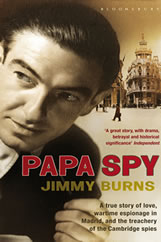In 1954 When I was a one year old , my Spanish mother took me to see a bit of Royal pageantry near Buckingham Palace on the occasion of Emperor Haile Selassie’s state visit to the UK.
So my mother told me many years later, she arrived to find that the crowds had built up, led by a line of uniformed English nannies with their young charges occupying the first row giving on to the main square from the side of St James’s Park.
Undeterred, my mother gently moved her pram and baby son to where the nannies stood erect and dominant and politely ,in best English, asked to be let in. The nannies reluctantly ceded some space just in time , for as they did so the Royal carriage bearing the Emperor and Queen Elizabeth 2nd rolled by . My mother waved enthusiastically and the Emperor turned towards her and nodded gracefully. As he did so, my mother heard one of the nannies next to her turn to another and say: “Oh, she must be one of them.”
My mother struggled to make sense in the twilight years of the British empire of the nannies’ expression of racial superiority and social entitlement , as she, together with their Queen honored an African emperor who had sought exile in Britain after his country was invaded in the 1930’s by Mussolini’s troops.
I’ve been thinking a lot these days of my later mother, and my later Father-an Anglo-Scot who served King and Country against Hitler in WW2 in the British embassy in Spain and after the war gathered Spaniards and British of different cultures and party loyalties in dialogue and friendship.
I was born in Madrid, and brought to the UK in nappies. I was educated in English schools and universities and trained and employed by British media, while regularly visiting and working in Spain .
I was brought up in a Britain that unlike the rest of Europe did not owe its democracy or its sense of itself as a nation to the rules and regulations of the EU, maintained its currency, and boasted a language that extended across continents.
But because I believe in building bridges not walls between peoples, I feel myself British and European. I campaigned and voted against Brexit and felt ashamed by some of the jingoistic thuggery that reached a crescendo in and around Trafalgar Square and other parts of England as the end of the UK’s EU membership finally became a reality.
That said I am sticking to my New Year resolution of viewing the UK’s exit from the EU with more light than darkness. I have so far refused to follow several friends and siblings in seeking by every possible means an alternative EU nationality rather than to hang on to my British passport.
Perhaps I owe my patriotism to that ‘drilling’ George Orwell spoke of doing its work among those of us educated in English schools and universities, , a sense of British history as an enduring ability to get out of a serious jam that it would be foolish to sabotage.
As the hours to midnight ticked away last Friday, I sought refuge in my London home, and indulged in watching again the film Dunkirk ,where some brave RAF pilots, seamen, and the small armada of civilian boats rescued what remained of the humiliated British expeditionary force, allowing Churchill’s to claim his Finest Hour, rallying the resistance to Hitler when all of Europe seemed doomed.
The film lifted my spirits, and I reflected that if there was a lesson from modern history it was that , of all EU countries, only the UK, by virtue of its past and present and faith in its own future, that could survive outside the EU but still linked to Europe, not only sharing in the democratic ideals of the EU’s founding fathers, but prepared to make them work better for the common good.
When asked by a Spanish journalist friend just hours earlier why it was that despite it all I still thought that the British could pull it off , I mentioned three words which I have experienced more in the UK than any mainland European country: accountability, transparency and excellence as exemplified by the rule of law ,the professionalism of the civil service-notably diplomats, its quality media, and its academic institutions , not to mention the Beatles and James Bond .
I also cannot remember any scandal involving diversion of EU funds involving a British farmer or politician or judge.
On the other hand British tourists and residents and investments have invigorated European countries, much as EU citizens have enriched London and other UK towns economically and culturally.
Honoring the rights of working people and the environment should be a key part of a post-Brexit Europe and the UK has an important role to play in ensuring this. Cooperative trade and business, and cultural and educational exchange must also be part of an agreement in the upcoming negotiations. The word Brexit should recede from our daily narrative. Britain and Europe working together on matters of common concern is what needs to be aimed at, with give and take on both sides , and positivity. The EU should not fear Britain but believe in the possibility of a new alliance with it that both sides can draw strength from.
I like the generosity of spirit of the newly minted British coin: ‘Peace, prosperity and friendship with all nations’ . It could have been scripted by Lennon and McCartney.
Britain is not at war with Europe, nor Europe with Britain not is there any remote prospect of such a calamity. There is however everything to gain, from making post-Brexit Britain work for the British and the EU in the best interests of both.

